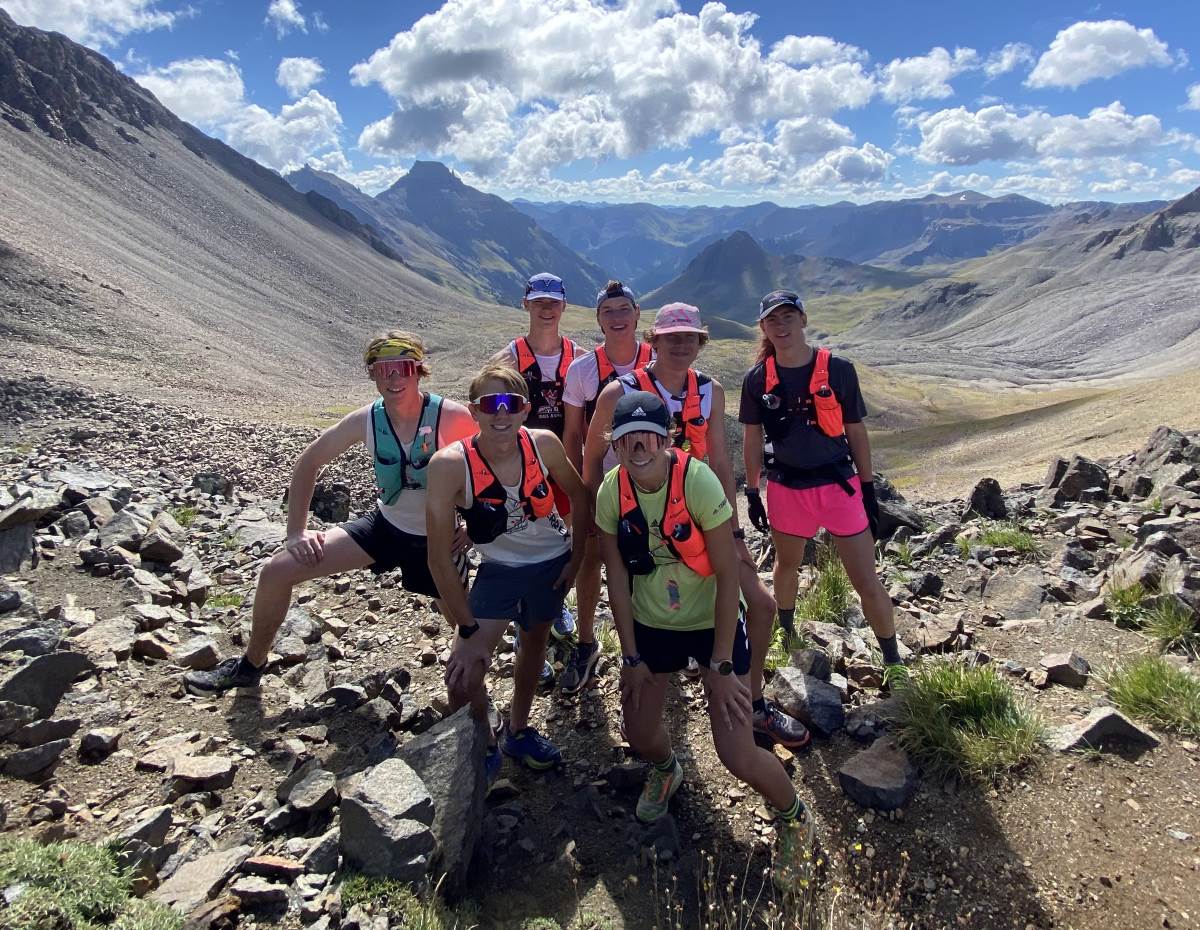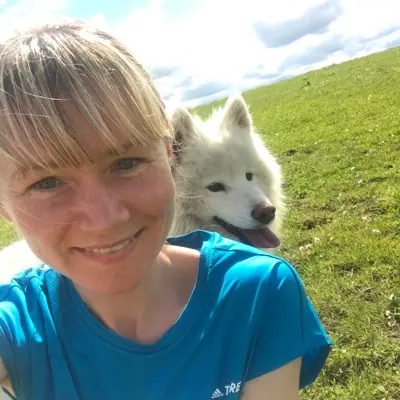Sure, there’s cross country as well as track and field, the two fairly universal running programs found at most colleges and universities.
But what would you say if we told you that there was an American university with a trail running team? It would be a rare surprise, indeed, but it exists in the trail running program at Western Colorado University in, you guessed it, western Colorado.
The Western Colorado University Trail Running Team has its origins in the university’s Mountain Sports program, which was the brainchild of mountain biker Dave Wiens. Wiens saw an opportunity to take advantage of the unique and extreme environment of western Colorado, where the college is located in the town of Gunnison, located at about 7,500 feet altitude and with easy access to spaces for all kinds of outdoor sports.
From the formation of the Mountain Sports program in 2012, the trail running offshoot grew a year later, largely thanks the efforts of trail runner and ultrarunner Duncan Callahan.
The vibrant and thriving Trail Running Team division of the Mountain Sports program is now headed up by coach Josh Eberly, who told iRunFar:
“His [Dave Wien’s] original thought was to try to create this Mountain Sports umbrella program and have these disciplines underneath, to try to fit our climate. And that way you can go from dirt, to winter and snow, and back to dirt. So having multifaceted athletes was really his vision, and to integrate it into a college system.”
The university now offers seven disciplines under its Mountain Sports program — namely, mountain biking, rock climbing, trail running, free riding, alpine skiing, Nordic skiing, and ski mountaineering. The program has been a huge success, not just in developing athletes, but in retaining students, and promoting a healthy and balanced lifestyle during their time at the university.
The ethos of the Trail Running Team has been the same from the beginning — to provide an all-inclusive, supportive environment; nurturing young athletes of all abilities to find their feet on the trails and achieve their own individual potential.
Before Eberly was recruited as head coach in 2015, the early days of the program were somewhat haphazard. As Callahan said, “We started things up in 2013. There was a really small group of athletes who were interested in taking part. We didn’t have any coaching, I was kind of the default where athletes would come to me and ask, ‘What should we run today?’ And I would send them on their way! But at some point, we thought, We really need to do this well. We overhauled the entire Mountain Sports program; we overhauled the Trail Running Team, and decided we were going to invest in legitimate coaching.”
Where both training and race choices had been less than thought out for the Trail Running Team’s first year, by the fall semester of 2014, Callahan and the other leaders were endeavoring to be more forward thinking and deliberate — working toward a set goal race for their athletes. That year, they targeted the Moab Trail Marathon, in November of 2014.
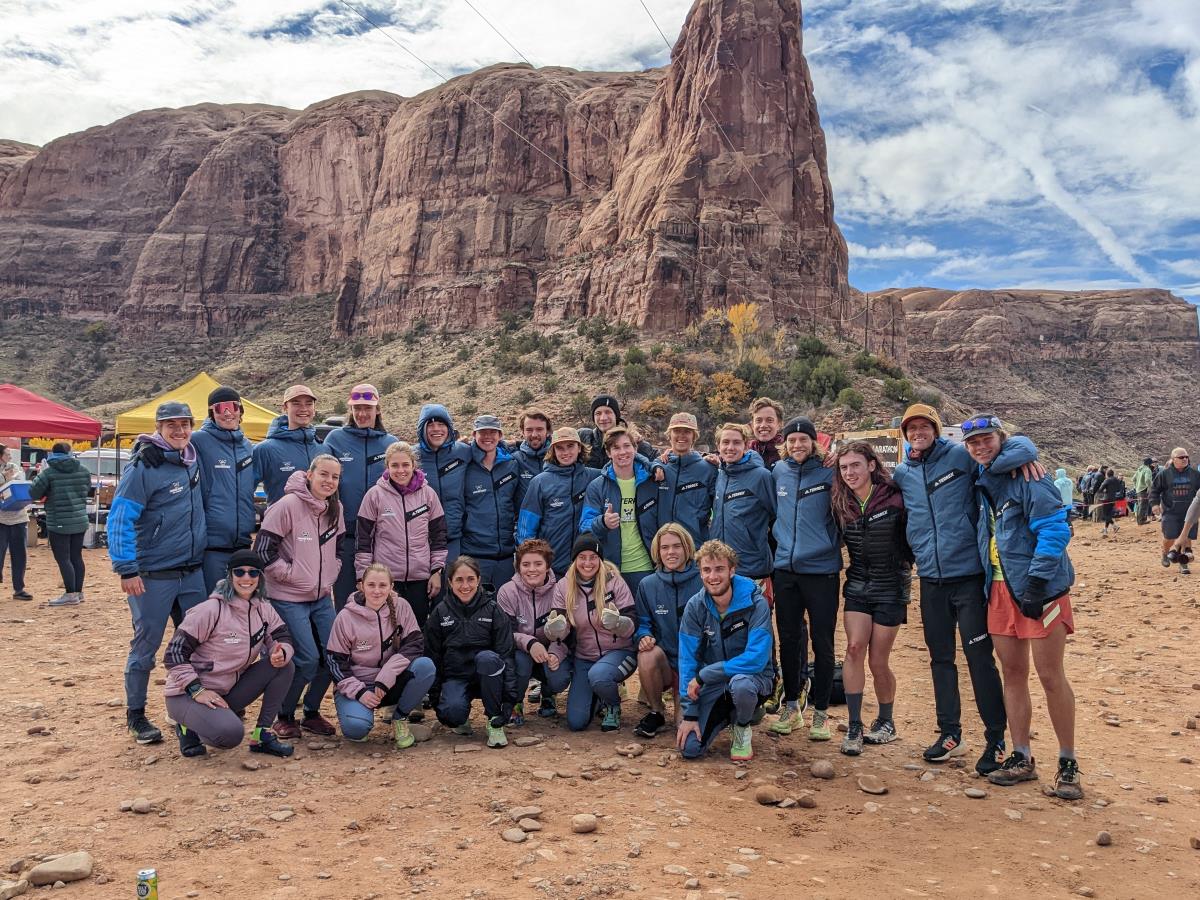
Runners from Western Colorado University Trail Running Team at the 2022 Moab Trail Marathon, which has become a staple race on their yearly race calendar. All photos courtesy of Josh Eberly unless otherwise noted.
Callahan said, “We brought a group of 30 athletes to that event. And that really highlighted to us that, We’ve got something here. We’ve got good runners, a group of people that is interested in running, and we’ve got a marquee event that we can bring them to.”
Crucial to the program’s development, Callahan and the other founders secured the backing of the university in terms of funding — to provide transport to and from the trails and events, as well as help funding race entries. The Trail Running Team is now also sponsored by the brand adidas Terrex, which provides not only full kit for the athletes, but also a travel budget for racing in the summer.

A Western Colorado University team vehicle. Securing funding for transport to the trails and events has been crucial to the program’s development.
In 2015, Josh Eberly was recruited as head coach for the Trail Running Team, and has guided its development ever since. He said:
“For the past eight years, we’ve had a large range of talent come through our program. The majority of our athletes have had experience in some sort of structured training in the past. Some of our athletes are training to finish their first race distance or better their times from previous years. While other athletes have more competitive goals in mind. I really try to home in on their goals and do everything that I can to get them as fit as we can within the given parameters.”
Eberly said that the higher achieving runners on the team are a beacon of hope and inspiration for the beginner level runners: “They really show what you can do in this sport, through hard work, showing up, and dedication. They showcase what it takes to succeed in our crazy tough sport.”
They now have athletes traveling to a packed calendar of races, including the U.S. Mountain Running Championships, which also act as the trial races for places on Team USA at the Trail and Mountain Running World Championships.
Eberly said, “We work with a lot of race directors around the nation, and they are really excited about having 15 to 20 of our young athletes at their races, because it brings unique energy to their event and a lot of good competition.”
With regard to coaching athletes of a range of experience and ability, Eberly said: “I’m still trying to figure out the best way to execute it, but I think every year is a bit different with the group of kids that I have to manage. Most times I break up the group in ranges through how many minutes they have to run in a day … Usually, if they don’t have a big running background, they’re not going to be super resilient to high mileage. I really try to tune in to their needs and find different ways to train, to enjoy it, and not get that burnt-out feeling.”
Eberly feels it’s crucial that every student who comes to the Trail Running Team has the opportunity to excel at their own level, rather than creating an elitist environment that’s purely high performance focused. He said, “I don’t really try to create this group environment where everyone has to do the same thing and only the ones who survive are successful.”

Coach Josh Eberly (center) with athletes from the Trail Running Team at Western Colorado University at the track.
While training for trail running for many is largely a solitary pursuit — peppered with the occasional social run — the athletes in the Trail Running Team at Western Colorado University do the vast majority of their running in a group environment for the nine months of the academic year.
Eberly said, “We meet Monday to Friday, and then sometimes we meet one day at the weekend to do an adventure run or exploratory long run if we don’t have a race. It’s a big commitment, it’s not like, ‘Show up when you can.’ It’s 3 p.m. to 5 or 5:30 p.m. Monday through Friday, so it is a lot of time. It makes them accountable.”
The training sessions are not purely based on getting in miles, but also involve twice-weekly weight training, core work, and a lot of trail-specific workouts — taking a wholistic approach to training — as well as educating the athletes on what they need to do to ensure longevity, and go forward with the sport independently after graduating.
Eberly said, “We have a lot of talks on areas like nutrition, and a lot of other variables that come with the trail and ultra world that you don’t think about when you’re running a five-kilometer race on the track.”
The students and coaches at Western Colorado University are blessed with a mountain playground right on their doorstep. As Eberly said, “We have a really good trail network right behind our school. We have 40 to 50 miles of singletrack terrain, when we don’t have snow. And we can drive 20 minutes away and get up to some high alpine mountains and better singletrack trails.”
Eberly endeavors to mix up the routes and take the runners to new locations each week — seeing the adventuring and exploring element as integral to the sport of trail running, while also developing the runners’ skillsets with a mix of terrain and altitude.
During the harsh Colorado winters, with many of the local trails impassable with snow, training is a little more limited during the week to dirt roads or road. However, on weekends the leaders will take the runners a little further to Montrose and Salida, where there is better year-round access to trails.
Athletes on the Trail Running Team get to try out a broad range of distances, in order to best find their niche within the sport, but Eberly is cautious about allowing them to pursue very long ultras at a young age. He said, “For my first three years of coaching, I allowed the 100k and 100-mile distances for these athletes. But I quickly realized that it was problematic. I found the physical and, more importantly, the mental demand of those distances was too much at that age.”
Now Eberly caps race distances for even the more experienced athletes on the program at 50 miles. He hopes that by progressing within the program, building up the distances in safe increments, athletes will have a strong foundation to progress to longer ultras after graduation should they wish to do so.
Cole Campbell is a post-graduate student at Western Colorado University, and an athlete with the Trail Running Team. He said, “This is my first year [with the trail program], I ran track and field collegiately at the College of Idaho and I took a gap year and coached a little bit of track in the spring.”
Prior to coming to Western Colorado University, while Campbell’s competitive focus was still cross country and track and field, he said: “I was always attracted to the trails. I grew up just south of the Ruby Mountains in Nevada, I did summer runs on the trails and I really enjoyed it.”
As a trail athlete, Campbell runs, as he puts it: “A little bit of everything, nowadays!” He said, “I ran a 50k in February, then [this weekend] we’ll be going to New Hampshire [to the U.S. Mountain Running Championships] and I’ll run the vertical kilometer and the classic mountain race there.”
Although already an accomplished and disciplined athlete, Campbell has flourished in the team environment of the Trail Running Team, and said: “It’s been amazing, just having a community aspect to it, and having teammates who are committed and dedicated to the program … Everybody brings a passion, which is so cool to see.”
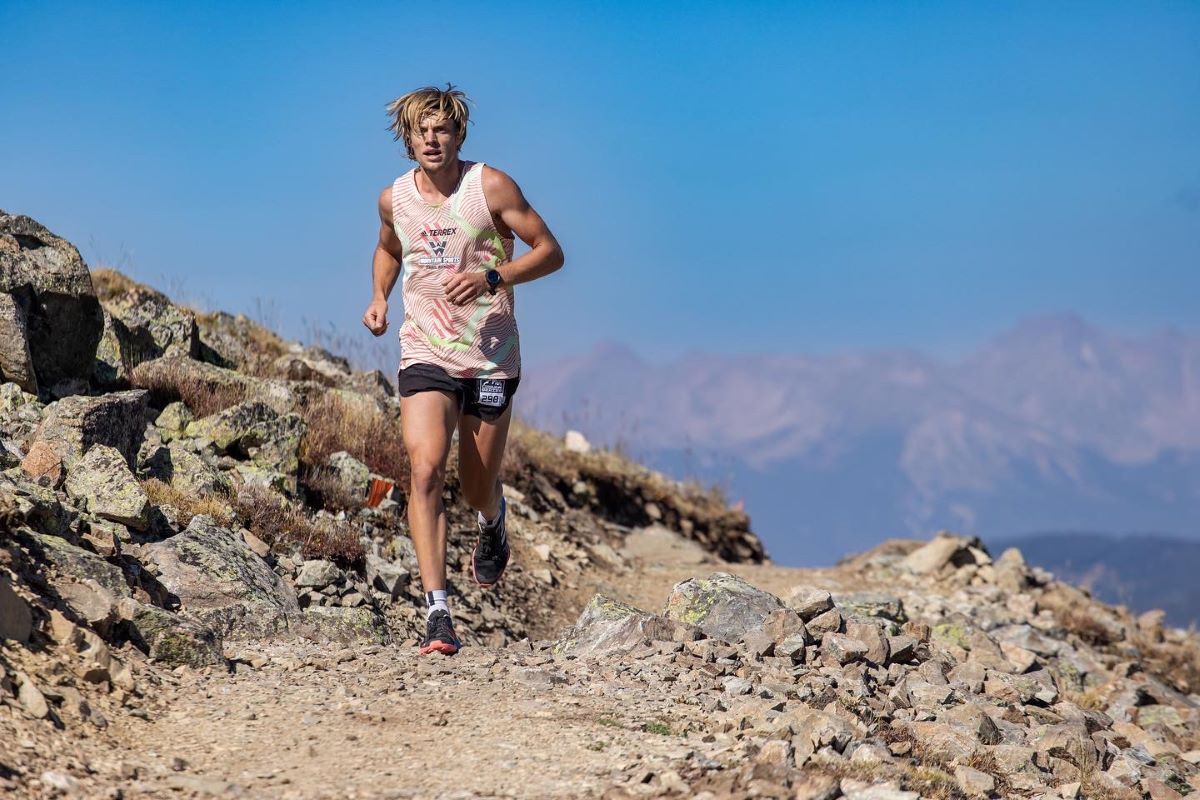
Cole Campbell racing the 2022 Cirque Series – Arapahoe Basin in Colorado. Photo courtesy of Cole Campbell.
Lindsey Farrar had no prior experience with trail running until she moved to Colorado during the COVID-19 pandemic, but has grown in confidence as an athlete through her involvement with the Trail Running Team. She said, “We all feed off of each other’s energy and successes and the excitement and grind is so contagious. Showing up every day to practice and running with my teammates, who have become some great friends of mine, adds a layer of both fun and accountability. There’s something to be said about grinding and pushing through challenges together and lifting each other up when need be. That kind of bonding connection and support just can’t be found if you’re running solo.”
As still a relative newcomer, just three years into her journey as a runner, Farrar says she is currently most comfortable with the 30k distance, but did recently complete a distance PR of 50k. She praised Eberly’s coaching, saying that he, “really knows the ins and outs of trail running, which enables him to work very specifically with individual athletes of varying skill levels. He is so inclusive and kind and makes running six days a week a fun endeavor!”
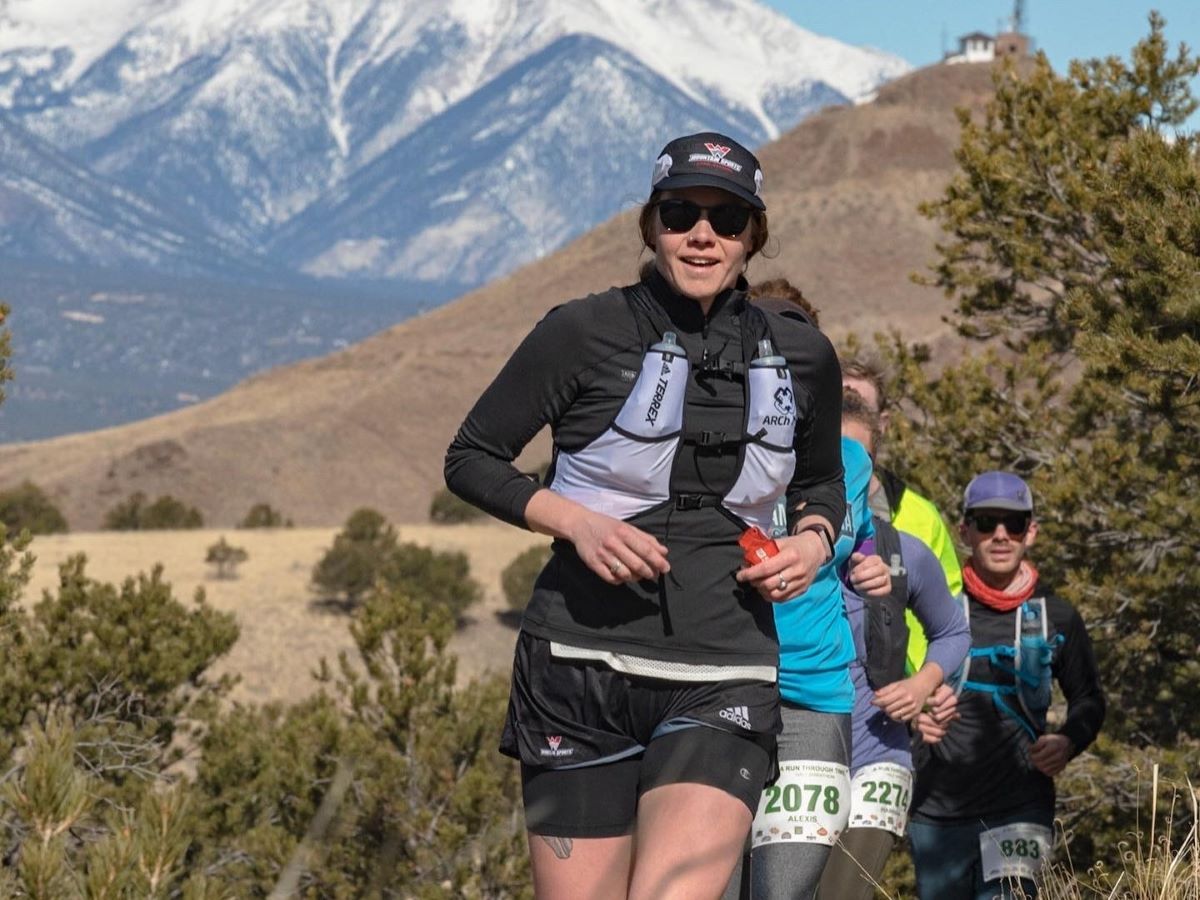
Lindsey Farrar racing the 2022 A Run Through Time Half Marathon in Salida, Colorado. Photo courtesy of Lindsey Farrar.
The hope going forward is that other universities will follow the lead of Western Colorado University in starting their own trail running programs, thus allowing university teams to compete against each other, as with the other running disciplines of cross country and track and field.
Eberly said, “That’s been our big initiative and objective since day one. We’re the only discipline within the Mountain Sports umbrella that does not have intercollegiate competition. The way I envision it in the future, is that we want to compete against other colleges and universities in trail races. That would be really fun and would incentivize other schools to step up and have a trail running program.”
Hopefully before long other universities will follow suit, and intercollegiate competition can form part of the ever-evolving sport of trail running and mountain running in the U.S.
Call for Comments
- Have you heard of the trail program at Western Colorado University?
- Do you know of any similar initiatives in other universities?
